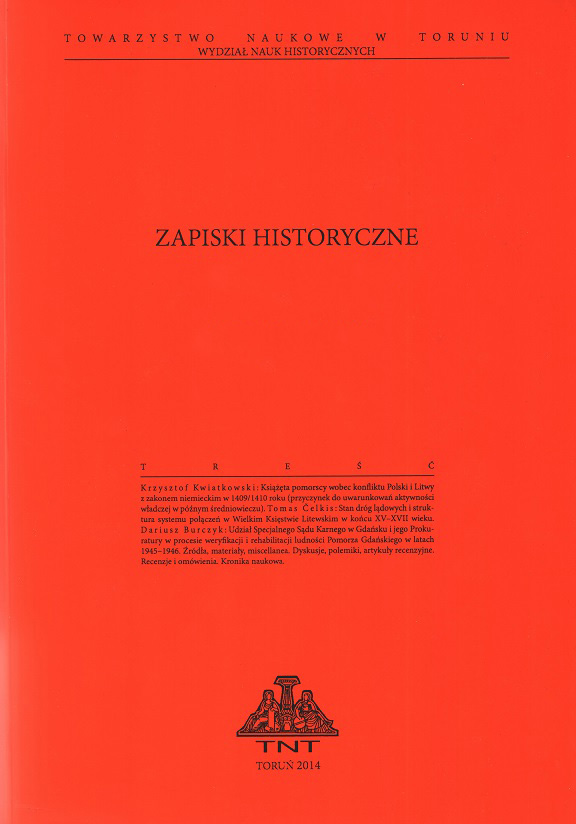Pisarze miejscy w kancelarii chełmińskiej od XIV do XVI wieku
The City’s Notaries in the Chancery of Chełmno from the 14th to the 16th Century
Author(s): Mateusz SuperczyńskiSubject(s): 13th to 14th Centuries, 15th Century, 16th Century
Published by: Towarzystwo Naukowe w Toruniu
Keywords: Chełmno;the city’s chancery;diplomacy;the city’s books of Chełmno;intellectual elite of Chełmno;
Summary/Abstract: The article addresses the hitherto unknown notaries of Chełmno in the context of the development of the city’s chancery from the 14th to the 16th centuries. On the basis of the thorough analysis of the sources – the city’s books (The judicial book of the city of Chełmno of the years 1330-1430, books of town councilors, accounting books) documents (recorded in the books and included in diplomatic codices) twelve notaries appearing in the sources as early as the first half of the 14th century have been identified. The author concentrated on the hitherto unknown notaries such as Nicolaus Konin (1328), Iohannes (1333) or Theodricus (1360-1370).The best known head of the city’s chancery in Chełmno is Konrad Bitschin (he held the office of the notary in the years 1430-1438) described by both German and Polish historians. The article shows the notary’s contribution in the organization and reform of the chancery indicating at the same time his achievements in other fields. The range of the notary’s work in the chancery is described by the extracts of the manuscript by Konrad Bitschin cited by the German historian Franz Schultz – “Manuale notarii civitatis Culmen”, where the city’s books established by him were recorded. The comparison of the condition of the city’s archive before Konrad Bitschin’s term of office with the list of new volumes gives us a picture of intensive works, the aim of which was to order the archive and to make the work of the Chełmno chancery more effective.Indicating the successors of Konrad Bitschin – Jacob Schoensee or Andreas Zommer – the author underlined the change in the way of running the chancery and much worse aptitude of the subsequent notaries, which was reflected in a much less accurate manner to keep the books.Apart from the description of the individual heads of the city’s chancery, the article addresses the nature of the work of the chancery, the most important duties of notaries, their remuneration and education.
Journal: Zapiski Historyczne
- Issue Year: 81/2016
- Issue No: 3
- Page Range: 37-58
- Page Count: 22
- Language: Polish

